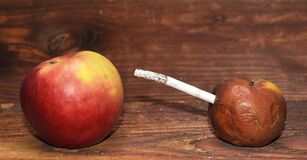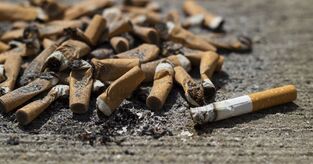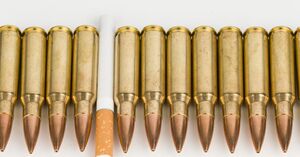Everyone knows the harmful effects of cigarettes, but not everyone is concerned with the mechanisms of recovery and return to life without a bad habit. It is the understanding of all the processes that take place in the body that can serve as an additional motivation when fighting nicotine addiction. Consider how quitting smoking happens and what it entails, and what to do to make breaking addiction as comfortable as possible.
What happens to the body when you stop smoking?
By quitting smoking before the onset of irreversible pathological processes, a person can, albeit for a long time, restore their health. Full body recovery even after short but regular use of tobacco products takes 5 to 10 years. However, the first signs of improvement in its performance can be seen after a few days.

To do this, it is worth trying to record on paper all the sensations that occur when you stop smoking. By keeping a quit smoking journal every day, you can be sure of all the changes that occur every day. It's also a way to build good motivation for yourself by celebrating any local success in this difficult endeavor.
Next, we will tell you more specifically how all organs and systems are restored.
How does the state of internal organs change?
Complete cessation of smoking has a beneficial effect on the human body, but not all changes can be seen with the naked eye. Let's see some of them:
- Blood pressure decreases, the risk of myocardial infarction decreases several times.
- The walls of the blood vessels are strengthened, the organs are enriched with oxygen.
- The bronchi have healed, the lungs are cleared of viscous sputum - it becomes easier to breathe, shortness of breath and annoying coughing passages.
- The chances of developing cancer, including the most common disorder of this type, lung cancer, are reduced.
- Smell and taste buds are restored.
- The liver is cleaned after prolonged exposure to toxic substances.
- The risk of sudden death is reduced by 10 times.
This is only the main part of what happens after you quit smoking, because almost all of a smoker's organs recover from the influence of the toxins and carcinogens contained in tobacco smoke.
External changes in the body after quitting smoking
Women are more interested in what happens when you quit smoking with your appearance. We hasten to answer that life without cigarettes will bring only positive changes to your appearance. Visual improvements can be seen within 4-6 weeks. First of all, the complexion becomes healthier, the grayish tint disappears due to the fact that toxins no longer enter the body, and the blood is saturated with oxygen. Teeth become noticeably whiter without being affected by the tar contained in tobacco products. The yellowish tinge that accompanies every smoker disappears from the fingers.
Teeth become noticeably whiter without being affected by the tar contained in tobacco products. The yellowish tinge that accompanies every smoker disappears from the fingers.
After 6 months, women notice the strengthening of the hair follicles and, as a result, a decrease in hair loss, an improvement in their appearance. Without the effects of tar and toxins, the skin of the body is improved thanks to the natural production of collagen, which is no longer blocked by smoking.
Quitting smoking: what happens in the body of a man and a woman
Human reproductive function suffers from smoking no less than the cardiovascular system or the lungs. But the timely cessation of the intake of toxic substances contained in cigarettes will preserve the health of women and men. Thus, women, in addition to general improvements, can observe the following changes in the body after quitting smoking:
- Normalization of hormone levels, as the toxins contained in tobacco smoke, which negatively affect the balance of hormones in the female body, will no longer be supplied.
- Improve the condition of the facial skin and reduce the risk of its premature aging due to the normalization of collagen production.
- There is a high chance of getting pregnant and carrying a healthy baby.
For men, parting with a bad habit will improve their sexual function. This applies not only to increasing potency, increasing the duration of sexual intercourse, but also the ability to reproduce healthy offspring.
The most common negative consequences of smoking cessation
Most people who have tried to overcome their nicotine addiction, first of all, notice changes that are not positive, but rather negative. This is not surprising, because from the cessation of nicotine intake in a person, a withdrawal syndrome occurs, a kind of withdrawal. To know what to prepare, consider what happens after you quit smoking:
- From the nervous system: increased irritability, decreased concentration, depression, anxiety, poor sleep quality or insomnia, general weakness and rapid fatigue.
- From the digestive tract: nausea, sharp increase in appetite, stomach pain.
- On the part of the respiratory system: increased cough with secretion of dark sputum.
- From the side of the ENT organs: sweating or feeling of "lump" in the throat, nasal congestion, mild runny nose.
All these symptoms can be minimized by supporting the body.
How to maintain immunity in the body?
The immune system responds immediately to changes associated with the cessation of nicotine intake and very often in the early stages this reaction is the opposite of the expected one. So often there are arguments that I haven't smoked for a month and that I've gotten sick much more often than smoking. Former smokers become more susceptible to various viruses and easily pick up any of them, this is associated with the restructuring of the body. Therefore, measures should be taken to strengthen the immune system. So, in the process of giving up tobacco products, doctors recommend taking multivitamin complexes, in which all the necessary vitamins and trace elements are balanced.

Also, in this case, the recipes of traditional medicine will not be superfluous. Tincture of echinacea, ginseng, green tea with honey and lemon will be a useful help.
Keep in mind that it is not recommended to resort to medication when parting with a bad habit.
How to help the lungs?
It is the lungs and bronchi that are particularly affected by tobacco smoke, so you should help them clear the phlegm often as soon as possible. To do this, you should consume a large amount of liquid. Natural plain water is ideal. In addition, it is necessary to pay attention to the humidity of the house. Dry air is known to inhibit productive coughing, thus slowing the cleaning process.
Herbs and syrups based on them are a good alternative to synthetic mucolytics. A cheap and effective option is licorice root syrup. You can also use herbal blends of lungwort, horsetail, plantain, elecampane, and elderberry in the form of tea. Therefore, when you stop smoking, changes in the body, namely the organs of the respiratory system, will proceed with the slightest discomfort.
How to overcome nervous system disorders associated with breaking a bad habit in the first month?
The greatest number of negative reactions that a former smoker feels about himself falls on the nervous system. Hence, almost every person notices a depressed state and in some cases even a depressive state. If you consider what happens when you quit smoking every day, then it is the nervous system that suffers more than others in the early stage.
As we noted above, taking medications at the time of quitting smoking is highly undesirable, but this rule does not apply to sedatives, which can effectively cope with increased mental stress. However, the drug should only be used as directed by a doctor.

Herbal enthusiasts should prepare soothing herbs such as motherwort, mint, valerian as tea or take in tablet form.
What can you do to prevent smoking cessation from gaining weight?
Particular attention should be paid to the diet so that changes after quitting smoking do not affect body weight. Weight gain is a consequence of increased appetite, and if you don't take this problem seriously, you can significantly gain weight. Often this very fact scares women who smoke, forcing them to give up the idea of giving up a bad habit.
A diet rich in fruits and vegetables should be included in the diet during the withdrawal period. Fiber is excellent for suppressing hunger and will allow you to feel full for a long time. You should also exclude the use of spicy and fatty foods, and also pay attention to desserts and pastries. The same can be said of lollipops and seeds, which for many are becoming a substitute for cigarettes. They should prefer apples, carrots or a glass of clean water.
What happens when you stop smoking every day?
A person can feel the first results of the fight against addiction in the first days. Moreover, it is during this period that the most pronounced are the negative reactions, which, like the positive ones, should be entered in the smoker's diary (if any) to get an overview, strengthen the spirit and understand what has already passed and not. Broken. So what is the risk of quitting smoking during the day:
- 1 day: appetite is disturbed, apathy occurs.
- 2nd day: nervousness appears, insomnia may appear.
- 3rd day: the urge to smoke becomes particularly strong.
- 4th day: cough intensifies with the secretion of sputum.
- Day 5: There is a constant feeling of hunger.
- Day 6: A depressive state may develop.
- 7th day: the withdrawal syndrome gradually subsides.
At the same time, the pulse and pressure stabilize, the risk of heart attack decreases, the sense of smell improves and the organs are saturated with oxygen.
Changes in the body after quitting smoking, occurring in a month, a year
For a person who has quit smoking, the effects on the body every day are just the beginning of a long recovery path, which lasts several years. However, it is the first year that is the most productive, because it is during this period that the maximum number of changes occur, which are displayed not only on the appearance, but also on the general condition of the former smoker:
- The volume of the lungs increases, increased fatigue and shortness of breath during physical exertion disappear.
- Both physical and psychological addiction to cigarettes disappears.
- The risk of developing cardiovascular disease is significantly reduced.
- The skin appears more attractive, its premature aging is prevented.
- Hair becomes shinier, nails stronger.
- Affected liver cells are restored.
- Cough and hoarseness disappear.
At this point, we can safely say that the addiction is gone.
What is the best way to launch sharply or gradually?
This is the question most often asked among smokers with different experience. There is an opinion that it is worth fighting addiction based on the duration of your own addiction. However, most doctors believe that phasing out tobacco smoke will not lead to positive results. The smoker's habit, therefore, does not go away and the body continues to require nicotine. Therefore, the best solution would be a complete and decisive rejection of tobacco products. Despite the fact that the smoker along the way will have to face the difficulties that we have described above, in the end he will preserve the most precious thing - health.

But there are some cases where it doesn't work abruptly to part with dependency. This applies to heavy smokers who consume an average of 1. 5-2 packs per day. In this it is worth trying to methodically reduce the amount smoked until it stops completely within a month.
As you can see, there will be many obstacles on the path to a healthy, nicotine-free life. The main thing is to understand that they are all temporary and prepare yourself for the fact that these temporary difficulties will not allow you to withdraw before the main goal - to become independent of nicotine.
























